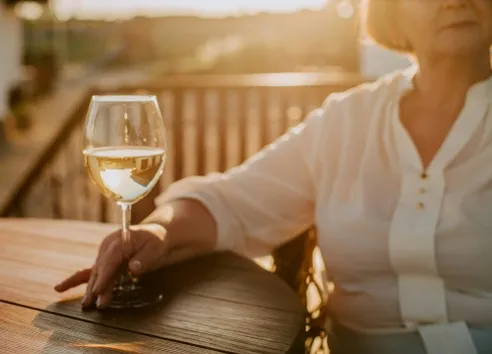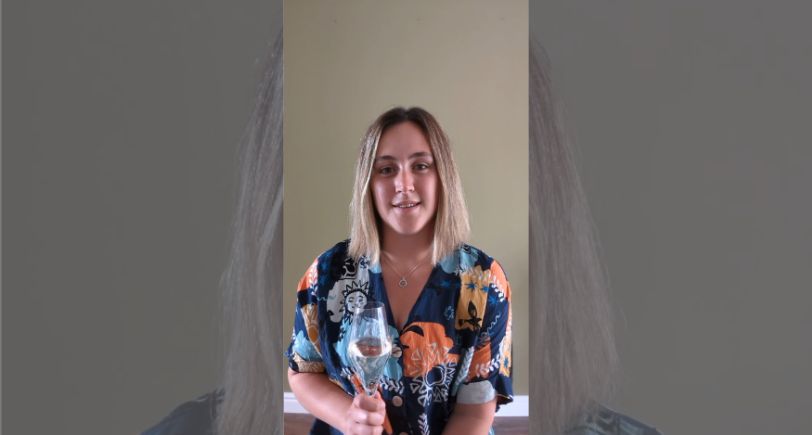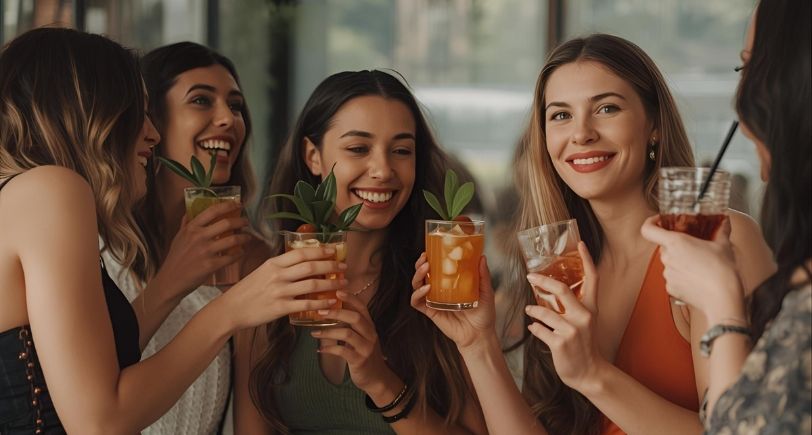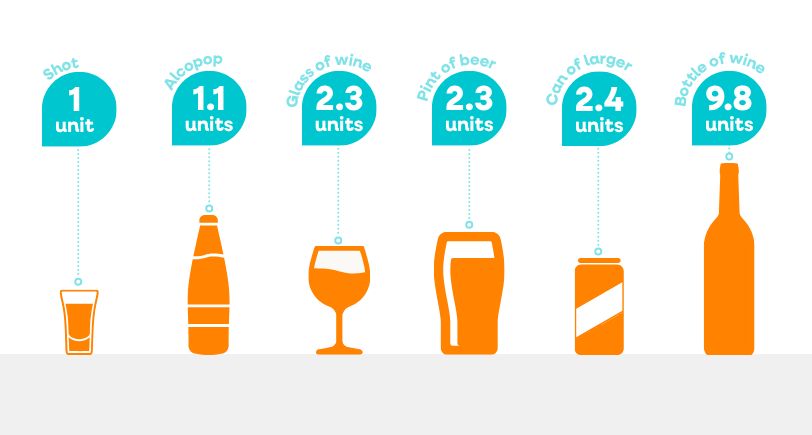Alcohol and breast cancer.
What is the link?

Does drinking alcohol increase my risk of breast cancer?
Yes, drinking any amount of alcohol increases your breast cancer risk. Scientific studies have shown that for women, when it comes to breast cancer risk, the more alcohol you drink, the greater your risk. If you do drink, it is important to keep to the current UK guidelines of no more than 14 units a week. This should be spread over at least three days and have several alcohol-free days in between.
Drinking alcohol is strongly linked to seven types of cancer: those affecting the mouth, throat, voice box (larynx), food pipe (oesophagus), bowel, and liver. It is also a significant risk factor for breast cancer. All types of alcohol increase the risk of cancer as it is the alcohol itself that causes the damage.
Tips for reducing the amount of alcohol you drink.
Drink in moderation.
Do not exceed the UK government guidelines of 14 units of alcohol per week. Know what 14 units of alcohol looks like.
Avoid binge drinking.
Consider switching between alcoholic and non-alcoholic drinks. Alternate with water: for every alcoholic drink you have, follow it with a full glass of water.
Take a break.
Aim to have some alcohol-free days each week. Pick two or three specific days in the week, like Tuesday, Thursday and Sunday, when you won't drink any alcohol at all.
Key facts about alcohol and breast cancer risk.
- In the UK, it is estimated that 8% (around 4,400) of female breast cancer cases are linked to alcohol consumption.
- Compared to non-drinkers, breast cancer risk is 9% higher in women who drink up to 2 units of alcohol per day, and 60% higher for women who drink 6 or more units per day.
- Several studies have found that drinking alcohol is mostly linked to the development of hormone receptor-positive breast cancer.
- Some evidence suggests that binge drinking (more than 6 units or 4 drinks in a short period) may result in a higher breast cancer risk, particularly for pre-menopausal women.
- For men, the link between alcohol isn’t clear. Some evidence suggests heavy drinking (more than 7.5 units/day) may increase a man’s breast cancer risk.
How does drinking alcohol increase your breast cancer risk?
The exact way alcohol increases a woman’s risk of breast cancer isn’t fully known, but scientists believe it’s due to some or all of the following reasons:
- Alcohol raises the levels of circulating hormones such as oestrogen, which can increase the number of times a cell divides. High levels of oestrogen is known to increase breast cancer risk.
- In the liver and breast tissue, alcohol is broken down to acetaldehyde, a chemical compound that can cause cancer by damaging cells and preventing their repair.
- Alcohol can damage the DNA inside the cell’s energy centres (mitochondria) and cause stress to the cells. Over time, this damages healthy cells and raises the risk of breast cancer.
- Alcohol may negatively affect the levels of certain vitamins and nutrients in the body, which are important in producing DNA in cells.
- Alcohol can promote weight gain, increasing the risk of breast cancer for post-menopausal women and men.
- Alcohol may also influence or interact with other known breast cancer risk factors, such as breast density and benign (non-cancerous) breast disease, which may increase overall risk.

Ask the scientist: Is there a safe amount of alcohol you can drink?
What is the recommended amount you should drink each week?
The UK guidelines on drinking alcohol recommend no more than 14 units of alcohol per week, spread across at least 3 days, with some alcohol-free days in between.
Different alcoholic drinks contain different amounts of alcohol. The amount of alcohol in a drink is measured in units, with 1 unit equalling 10ml or 8g of pure alcohol (ethanol) found within that drink.
Alcoholic drinks are often also labelled with a percentage, followed by the abbreviation ‘ABV’. This stands for Alcohol By Volume. This number is the amount of alcohol in that drink.
Check the label; many bottled and canned drinks will list the number of units directly on the label.
Use online tools, such as NHS.uk and Drinkaware , which offer simple calculators to do the math for you.
Common drinks and their unit totals:
- Single shot of spirits (25ml at 40% ABV): 1 unit.
- Standard glass of wine (175ml at 13% ABV): 2.3 units.
- Bottle of wine (750ml at 13% ABV): 9.8 units.
- Can of lager (440ml at 5.5% ABV): 2.4 units.
- Small bottle of beer (375ml at 4.5% ABV): 1.7 units.
- Pint of beer (568ml at 4% ABV): 2.3 units.
- Alcopop or flavoured mixed drinks (275ml at 4%): 1.1 units.
Start your prevention journey today.
To begin reducing how much alcohol you drink, choose one of these actions to commit to this week:
- Choose alcohol-free days: Pick two or three specific days this week, like Tuesday and Thursday, when you won't drink any alcohol at all.
- Alternate with water: For every alcoholic drink you have, follow it with a full glass of water.
- Try a new non-alcoholic drink: There are lots of non-alcoholic brands available now, or try a mocktail when you're out or make your own at home (download our free mocktail recipe book today).
Remember, these small steps can make a big difference. Which one will you try first?
Further reading
For more details, please see our Alcohol and Breast Cancer science review.
If you need further support regarding alcohol, contact your GP, who will be able to provide confidential advice and support.
Last review: Aug-25 | Next review: Aug-28.
-
[1] Drinkaware. What is alcohol? Ingredients, chemicals and manufacture 2023. https://www.drinkaware.co.uk/facts/information-about-alcohol/alcohol-and-the-facts/what-is-alcohol-ingredients-chemicals-and-manufacture (accessed August 6, 2025).
[2] International Agency for Research on Cancer. Alcohol Drinking. IARC Monographs on the Evaluation of the Carcinogenic Risks to Humans 1988;44. https://publications.iarc.who.int/Book-And-Report-Series/Iarc-Monographs-On-The-Identification-Of-Carcinogenic-Hazards-To-Humans/Alcohol-Drinking-1988
[3] NHS. Alcohol units 2024. https://www.nhs.uk/live-well/alcohol-advice/calculating-alcohol-units/ (accessed August 6, 2025).
[4] Drinkaware. What is an alcohol unit? 2023. https://www.drinkaware.co.uk/facts/information-about-alcohol/alcoholic-drinks-and-units/what-is-an-alcohol-unit/ (accessed August 6, 2025).
[5] UK Chief Medical Officers. UK Chief Medical Officers’ Low Risk Drinking Guidelines 2016. https://assets.publishing.service.gov.uk/media/5a80b7ed40f0b623026951db/UK_CMOs__report.pdf (accessed August 6, 2025).
[6] Cancer Research UK. How does alcohol cause cancer? 2023. https://www.cancerresearchuk.org/about-cancer/causes-of-cancer/alcohol-and-cancer/how-does-alcohol-cause-cancer#alcoholrefs0 (accessed August 6, 2025).
[7] Rumgay H, Shield K, Charvat H, Ferrari P, Sornpaisarn B, Obot I, et al. Global burden of cancer in 2020 attributable to alcohol consumption: a population-based study. Lancet Oncol 2021;22:1071–80. https://doi.org/10.1016/S1470-2045(21)00279-5.
[8] Brown KF, Rumgay H, Dunlop C, Ryan M, Quartly F, Cox A, et al. The fraction of cancer attributable to modifiable risk factors in England, Wales, Scotland, Northern Ireland, and the United Kingdom in 2015. Br J Cancer 2018;118:1130–41. https://doi.org/10.1038/s41416-018-0029-6.
[9] Sohi I, Rehm J, Saab M, Virmani L, Franklin A, Sánchez G, et al. Alcoholic beverage consumption and female breast cancer risk: A systematic review and meta‐analysis of prospective cohort studies. Alcohol, Clinical and Experimental Research 2024;48:2222–41. https://doi.org/10.1111/acer.15493.
[10] World Cancer Research Fund/ American Institute for Cancer Research. Alcoholic drinks and the risk of cancer. Continuous Project Expert Report 2018. https://www.wcrf.org/wp-content/uploads/2024/10/Alcoholic-Drinks.pdf
[11] Sun Q, Xie W, Wang Y, Chong F, Song M, Li T, et al. Alcohol Consumption by Beverage Type and Risk of Breast Cancer: A Dose-Response Meta-Analysis of Prospective Cohort Studies. Alcohol and Alcoholism 2020;55:246–53. https://doi.org/10.1093/alcalc/agaa012.
[12] Mostofsky E, Lee I-M, Buring JE, Mukamal KJ. Impact of Alcohol Consumption on Breast Cancer Incidence and Mortality: The Women’s Health Study. J Womens Health 2024;33:705–14. https://doi.org/10.1089/jwh.2023.1021.
[13] Shield KD, Soerjomataram I, Rehm J. Alcohol Use and Breast Cancer: A Critical Review. Alcohol Clin Exp Res 2016;40:1166–81. https://doi.org/10.1111/acer.13071.
[14] Coles CE, Earl H, Anderson BO, Barrios CH, Bienz M, Bliss JM, et al. The Lancet Breast Cancer Commission. The Lancet 2024;403:1895–950. https://doi.org/10.1016/S0140-6736(24)00747-5.
[15] World Cancer Research Fund/ American Institute for Cancer Research. Diet, Nutrition, Physical Activity and Cancer: a Global Perspective. Continuous Update Project Report 2018. https://www.wcrf.org/wp-content/uploads/2024/11/Summary-of-Third-Expert-Report-2018.pdf
[16] Sánchez-Bayona R, Gea A, Gardeazabal I, Romanos-Nanclares A, Martínez-González MÁ, Bes-Rastrollo M, et al. Binge Drinking and Risk of Breast Cancer: Results from the SUN (‘Seguimiento Universidad de Navarra’) Project. Nutrients 2020;12:731. https://doi.org/10.3390/nu12030731.
[17] Cook MB, Guénel P, Gapstur SM, van den Brandt PA, Michels KB, Casagrande JT, et al. Tobacco and Alcohol in Relation to Male Breast Cancer: An Analysis of the Male Breast Cancer Pooling Project Consortium. Cancer Epidemiology, Biomarkers & Prevention 2015;24:520–31. https://doi.org/10.1158/1055-9965.EPI-14-1009.
[18] Guénel P, Cyr D, Sabroe S, Lynge E, Merletti F, Ahrens W, et al. Alcohol Drinking May Increase Risk of Breast Cancer in Men: A European Population-Based Case–Control Study. Cancer Causes & Control 2004;15:571–80. https://doi.org/10.1023/B:CACO.0000036154.18162.43.
[19] Rumgay H, Murphy N, Ferrari P, Soerjomataram I. Alcohol and Cancer: Epidemiology and Biological Mechanisms. Nutrients 2021;13:3173. https://doi.org/10.3390/nu13093173.
[20] NHS. Calories in alcohol 2023. https://www.nhs.uk/live-well/alcohol-advice/calories-in-alcohol/ (accessed August 6, 2025).
[21] Voevodina O, Billich C, Arand B, Nagel G. Association of Mediterranean diet, dietary supplements and alcohol consumption with breast density among women in South Germany: a cross-sectional study. BMC Public Health 2013;13:203. https://doi.org/10.1186/1471-2458-13-203.
[22] Freudenheim JL. Alcohol’s Effects on Breast Cancer in Women. Alcohol Res 2020;40. https://doi.org/10.35946/arcr.v40.2.11.


